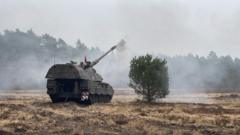Despite the relentless bombardment threatening the city of Pokrovsk, the haunting melody of Shchedryk serves as a powerful beacon of resistance for its residents and defenders. As they face increasing danger and upheaval, the music inspires resilience and a deep-seated connection to their heritage.
The Resilient Spirit of Pokrovsk: A Carol of Defiance Amidst Destruction

The Resilient Spirit of Pokrovsk: A Carol of Defiance Amidst Destruction
As Pokrovsk braces for Russian advances, its iconic carol—Shchedryk—is being embraced by defenders as a symbol of hope and cultural identity.
In a city known for its musical heritage and the beloved Christmas carol Shchedryk, the winter season arrives shrouded in despair. Pokrovsk, located in eastern Ukraine, now witnesses the grim realities of war, with Ukrainian residents contending with heavy artillery sounds and the devastation of their homes as Russian forces approach ominously close—less than two miles from the city center.
Traditionally vibrant with holiday spirit, Pokrovsk’s streets remain largely empty, decorated only with a light layer of snow. The once-thriving town is now home to few, as many inhabitants have fled amidst fears of bombardment. Those who remain, like Ihor and Oksana, face daily struggles simply to survive, scavenging for wood and coal to stay warm while grappling with the uncertainty of their city's fate. Oksana reflects on her fears, admitting the likelihood that Pokrovsk may soon fall into Russian hands.
Historically significant for the music it birthed, Pokrovsk’s connection to Mykola Leontovych, the composer of Shchedryk, is under dire threat. His statue has been relocated, and the music school named after him lies deserted. While the tune is familiar to many worldwide, having been popularized in Western culture, in Ukraine, it is known as a symbol of resilience. On a more somber note, the music now elicits feelings of nostalgia and loss, as families like the Hasych's strive to keep their memories alive while living in relative safety elsewhere.
In a poignant display of solidarity, a Ukrainian military band has adopted Shchedryk as an anthem of defiance, inspiring soldiers on the front line. Colonel Bohdan Zadorozhnyy leads the band, noting the importance of the song in lifting the spirits of troops. It is more than a melody—it’s viewed as an embodiment of national pride and a steadfast declaration of cultural identity. Soldiers use makeshift instruments made from weaponry, transforming the horrors of war into a resounding cry for freedom.
The director of the local history museum, Angelina Rozhkova, works tirelessly to preserve Pokrovsk’s cultural artifacts, arguing that Russia's intentions extend far beyond territorial conquest; they aim to erase Ukrainian cultural identity. Despite the uncertainty of returning home, Angelina echoes the sentiments of her fellow residents: their hearts and souls remain tied to their heritage.
While Pokrovsk might approach a pivotal moment in its history, its people demonstrate exceptional resilience, facing adversity with courage. As the haunting strains of Shchedryk resound in the hearts of both displaced families and soldiers, it serves as a reminder that their legacy and cultural identity endure, even amidst the shadows of conflict.
Traditionally vibrant with holiday spirit, Pokrovsk’s streets remain largely empty, decorated only with a light layer of snow. The once-thriving town is now home to few, as many inhabitants have fled amidst fears of bombardment. Those who remain, like Ihor and Oksana, face daily struggles simply to survive, scavenging for wood and coal to stay warm while grappling with the uncertainty of their city's fate. Oksana reflects on her fears, admitting the likelihood that Pokrovsk may soon fall into Russian hands.
Historically significant for the music it birthed, Pokrovsk’s connection to Mykola Leontovych, the composer of Shchedryk, is under dire threat. His statue has been relocated, and the music school named after him lies deserted. While the tune is familiar to many worldwide, having been popularized in Western culture, in Ukraine, it is known as a symbol of resilience. On a more somber note, the music now elicits feelings of nostalgia and loss, as families like the Hasych's strive to keep their memories alive while living in relative safety elsewhere.
In a poignant display of solidarity, a Ukrainian military band has adopted Shchedryk as an anthem of defiance, inspiring soldiers on the front line. Colonel Bohdan Zadorozhnyy leads the band, noting the importance of the song in lifting the spirits of troops. It is more than a melody—it’s viewed as an embodiment of national pride and a steadfast declaration of cultural identity. Soldiers use makeshift instruments made from weaponry, transforming the horrors of war into a resounding cry for freedom.
The director of the local history museum, Angelina Rozhkova, works tirelessly to preserve Pokrovsk’s cultural artifacts, arguing that Russia's intentions extend far beyond territorial conquest; they aim to erase Ukrainian cultural identity. Despite the uncertainty of returning home, Angelina echoes the sentiments of her fellow residents: their hearts and souls remain tied to their heritage.
While Pokrovsk might approach a pivotal moment in its history, its people demonstrate exceptional resilience, facing adversity with courage. As the haunting strains of Shchedryk resound in the hearts of both displaced families and soldiers, it serves as a reminder that their legacy and cultural identity endure, even amidst the shadows of conflict.




















